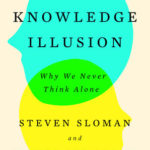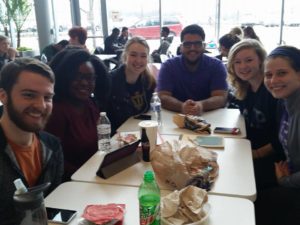None of us thinks alone.
We all face social pressure from our social groups.
My friendships are broad.
Some swear by CNN, others by Fox.
There are those who ally themselves with Rush, others with NPR.
One group call themselves “progressive” another, “conservative.”
Certain groups cheered this past election, others cried.
Select folks begin discussions with “social justice,” others start with “justice.”
 We like to think our perspectives are our own. We think somehow we are independent thinkers. We pride ourselves in believing that our perception is right because we have carefully considered all sides. We are ever touting the righteousness of our cause. We believe what we believe.
We like to think our perspectives are our own. We think somehow we are independent thinkers. We pride ourselves in believing that our perception is right because we have carefully considered all sides. We are ever touting the righteousness of our cause. We believe what we believe.
What we do not often acknowledge, however, is that our viewpoint is shaped by social pressure.
 A recent Vox conversation with Brown University cognitive scientist Steven Sloman (find the article here) was aptly subtitled: “Why We Pretend to Know More Than We Do.” Sean Illing asked Sloman the following question:
A recent Vox conversation with Brown University cognitive scientist Steven Sloman (find the article here) was aptly subtitled: “Why We Pretend to Know More Than We Do.” Sean Illing asked Sloman the following question:
Illing: How do people form opinions?
Sloman: I really do believe that our attitudes are shaped much more by our social groups than they are by facts on the ground. We are not great reasoners. Most people don’t like to think at all, or like to think as little as possible. And by most, I mean roughly 70 percent of the population. Even the rest seem to devote a lot of their resources to justifying beliefs that they want to hold, as opposed to forming credible beliefs based only on fact.
Think about if you were to utter a fact that contradicted the opinions of the majority of those in your social group. You pay a price for that. If I said I voted for Trump, most of my academic colleagues would think I’m crazy. They wouldn’t want to talk to me. That’s how social pressure influences our epistemological commitments, and it often does it in imperceptible ways.
 The title of Sloman’s most recent book is telling: The Knowledge Illusion: Why We Never Think Alone.
The title of Sloman’s most recent book is telling: The Knowledge Illusion: Why We Never Think Alone.
Simply said, social pressure influences our thinking.
 “Social pressure” can be just another idol, an idol of which we should be wary.
“Social pressure” can be just another idol, an idol of which we should be wary.
All of us need to accept:
We may be wrong: we need to spend more time hearing other perspectives.
We may be right, but we need to accept others may hold pieces of truth.
We should question our own groups: they may be wrong.
We should listen to other groups: they may be right.
 My role as a Christian cultural apologist (see my essay here) assumes all authority, all knowledge, all assumptions begin here: Yahweh, The Personal Eternal Triune Creator of the universe exists and has spoken in His Word and His world. My research and writing arises from a decidedly biblical vantage point. I am responsible to engage not just data, but people and their social pressures.
My role as a Christian cultural apologist (see my essay here) assumes all authority, all knowledge, all assumptions begin here: Yahweh, The Personal Eternal Triune Creator of the universe exists and has spoken in His Word and His world. My research and writing arises from a decidedly biblical vantage point. I am responsible to engage not just data, but people and their social pressures.
But I am also aware that I am swayed in my thinking—as we all are—by social pressures.
Others with other social pressures may describe themselves in other ways.
But let’s not fool ourselves. None of us thinks alone.
 Christian “social commitments” are very important to Comenius students. “We encourage each other with sound doctrine” (Titus 1.9) is imperative during the college years for Christian students. Dr. Mark Eckel is president of The Comenius Institute (our one-minute video here).
Christian “social commitments” are very important to Comenius students. “We encourage each other with sound doctrine” (Titus 1.9) is imperative during the college years for Christian students. Dr. Mark Eckel is president of The Comenius Institute (our one-minute video here).
AFTERWORD: I believe my work in the culture is as a priest, a go-between, between people and God, a prophet, a mouth-piece for God to people, and an evangelistic-apologist, a defender of God’s Words & Works in the public square.



There is no such thing as a “free thinker”.
I will not dispute your claim that all of us know in community, in relationship, in conversation and dialogue with our immediate friends, neighbors and colleagues – including scientific discovery and invention. I speak of this at The Charles Malik Society page on Facebook all the time,
https://www.facebook.com/groups/123177334382323/
and find plenty of support for this idea in a 30 year old paper “Collaborative Learning and the “Conversation of Mankind”, by Kenneth Bruffee and then in work by him and others since then.
https://www.uni-bielefeld.de/exzellenz/lehre/docs/Bruffee_Collaborative_Learning.pdf
However, it seems to me that you overemphasize the idea of “social pressure”, and make what is a constantly natural process into one for which we must always be suspicious. Not that we become naive about human limitations, mistakes, even sin. But, common grace rules here more than we might think. * https://bit.ly/1O1HlAd
For example, Steven Shapin, professor emeritus of history of science at Harvard, has a couple books that emphasize the trust and civility which make science possible, and which early scientists recognized as crucial to their work, since they depended on truthful reports of work others were doing. See at least his books here A Social History of Truth: Civility and Science in Seventeenth-Century England (Chicago, 1994) and The Scientific Life: A Moral History of a Late Modern Vocation (Chicago, 2008).
https://scholar.harvard.edu/shapin/-publications
Another resource to consider is Loving to Know: Covenant Epistemology by Esther Meek,
https://www.longingtoknow.com/loving-to-know-l2k.html
where she argues that all knowledge is a process of conversation, community, interpersonal relationships, and for her the added Christian idea of covenant. Personally, I find her ideas hold up without the additional aspect of covenant, that drawing on Michael Polanyi and his ideas about the scientific community is enough. However, I do agree with her that her ideas about covenant work well by adding a moral dimension to the communities of conversation and then knowledge in which we all are constantly a part.
Yes, social pressure can and does influence our thinking. But, let’s not let that overwhelm the larger understanding we need in order to better appreciate that all the knowledge we have and continue to gather, both good and false, is a community and conversational enterprise, remembering that some in our community and with whom we converse are long dead and so we join their contributions in books, music, art works, movies and records of all sorts.
Even as a High School student, you were a defender of God’s Words and Works in that “public square”!
John, I am grateful for your reply.
I do believe that where our Christian perceptions (yours and mine) diverge, may originate in the emphasis we place on human dignity and human depravity. My focus is always to hold these ideas in tension. However, my conservative-preservative bent knows that human corruption is pervasive. [We move too far afield if we do not focus on human worth.] You mention Keller’s good piece on “common grace”, for instance, but do not highlight his comments on The Fall. If we Christians argue for common grace, we must also acknowledge common guilt.
At times, as is the case in the essay to which you refer, the focus is clearly in one direction. In the case of the Vox interview, it’s important to reference a person’s words and the intention they carry. To suggest that I think we should “always be suspicious” is not at all my intention, highlighted by how many times I use the word “may” as it relates to our thinking.
My essays tend to be in the 500-600 word design for the sake of the audience; the point being, I will not craft a 5000 word intricate engagement of every cultural artifact I employ in my W&W writing. This essay focused on how social groups may sway our thinking. That was the sole intent.
My focus on human dignity and common grace, while certainly applicable in the current conversation, will not be on full display in this essay. Again, in the case cited, I allow the statements in the interview to stand for themselves. It is one point among many to be sure. We all employ our lens to look at life from our own biases. We cannot do otherwise.
I have read Shapin and Meek. I do not see anything in those books that would suggest something other than what is stated in my essay. I would disagree with the use of your term “overwhelm” to characterize the essay. You yourself focus on “community” often in your response here. “Conversation in community” is still fraught with the same problem of human corruption, albeit, we take “both good and false.” I would disagree little with what you’ve said since I’ve written positively toward each of the ideas you have put forward.
At the beginning of your response you say
“it seems to me that you overemphasize the idea of ‘social pressure’ and make what is a constantly natural process into one for which we must always be suspicious.”
I agree that the process is “natural,” therefore permeated by corrupt thought, word, and action, teaching which we must not forsake if we are to understand a Christian view of human nature, seeing people as inherently sinful. “A natural process” cannot be neutral. There is no neutrality in a fallen world (also point #2 here). I believe we live with the tension of dignity-depravity ever since Genesis 3 and must then only depend on the exclusive salvific claims of Christ.
Thanks for your response.